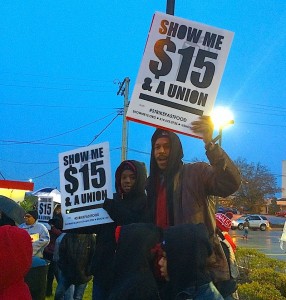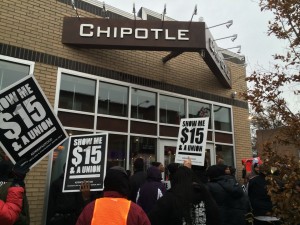 Home care workers, convenience store cashiers, discount store clerks, airport workers, Walmart associates and federally-contracted service workers call for $15
Home care workers, convenience store cashiers, discount store clerks, airport workers, Walmart associates and federally-contracted service workers call for $15
(EDITOR’S NOTE: See full coverage of fast-food worker strikes in the Dec. 11 edition o the Labor Tribune.)
St. Louis – Two years after 200 New York City fast-food workers walked off their jobs, sparking a nationwide movement for $15 and union rights, cooks and cashiers at McDonald’s, Burger King, Wendy’s and other major national chains went on strike Thursday in St. Louis along with fast-food workers in more than 190 cities – the most ever.
The strikes come one week after Walmart workers led nationwide Black Friday strikes to protest the company’s illegal threats against workers calling for $15 an hour and full-time work.
FIGHT FOR $15 IS GROWING
Nationally, striking fast-food workers were joined for the first time by convenience store clerks and dollar-store workers in two-dozen cities, including St. Louis.
Baggage handlers, skycaps, wheelchair attendants and aircraft cleaners from 10 major airports supported the fast-food strikers as the Fight for $15 movement continued its spread to new industries. The Home Care Workers’ Fight for $15, which launched in September, more than tripled in size, reaching 19 cities from coast to coast.
Also Thursday, federally-contracted food service workers at a gigantic McDonalds location at the Smithsonian Air and Space Museum in Washington, DC, went on strike, joining the call for $15/hour.
‘I DON’T WANT HIS OUTLOOK TO BE LIKE MINE’
“Every day I work my hardest and still have to wonder how I’m going to pay all the bills and put food on the table. I have three children, and one who works in fast food. I don’t want his outlook to be like mine,” said Latasha Chapple, a 32-year old mother of three who is paid $7.50 an hour at Wendy’s in St. Louis, MO.
“It encourages us seeing home care and retail workers fighting for $15 too. This fight is growing and we are going to keep going until we win.”
SOCIAL AND ECONOMIC DISPARITY
Fast food workers, faith and community gathered in the hundreds and took over the Hardee’s on South Hampton, pausing for a moment of silence in remembrance of Mike Brown and Eric Garner – and the social and economic disparity their deaths represent.
‘FAIR WAGES AND RESPECT’
David Nehert-Flores, Community Co-Chair of St. Louis Jobs with Justice joined workers on the strike lines.
“It’s inspiring to once again see workers from across the region stand up for their right to fair wages and respect on the job,” he said.
“These workers’ actions today show what a unified call for $15 and a union can accomplish because when workers win, the benefits are shared throughout the community.”
NATIONWIDE EFFORT
Workers went on strike in every region of the country at major fast-food restaurants including McDonald’s, Burger King, Wendy’s, KFC, Taco Bell and Domino’s.
The fast-food movement continues to spread, with workers walking off their jobs for the first time in Jackson, MS, Knoxville, TN, Buffalo, NY, Olympia, WA, and dozens of smaller cities and towns.
Across the country, workers reacted to the issues raised in Ferguson, MO, and Staten Island, NY, by beginning their strike actions a with a moment of silence.
Workers decided on this symbolic gesture to show support for the families of Eric Garner and Michael Brown and to show that they will stand up until every American life is respected and every American is paid enough to support their families with dignity.
REWIRING HOW AMERICA THINKS ABOUT WAGES
The growing Fight for $15 has been credited with elevating the debate around inequality in the U.S.
The online magazine Slate called the movement a “stunning success” and wrote that, “dedicated fast-food workers have managed to completely rewire how the public and politicians think about wages.”
What seemed like a far-fetched goal – $15 an hour –is now a reality in SeaTac and Seattle, where Bloomberg News said the city adopted “the rallying cry of fast-food workers” and where local low-wage airport workers played a leading role in winning the historic wage increase.
In November, San Francisco became the third city in the U.S. to adopt a $15 minimum wage, and just this week, Chicago lawmakers voted to raise the Windy City’s minimum wage to $13.
Since the first strike in 2012, more than 8 million low-wage workers across the country have gotten raises through local ballot measures, city and state legislation and contract negotiations.
As fast-food workers in the U.S. fight for a living wage and the right to a union, Denmark – where workers earn $20 or more per hour, strikes a devastating blow to McDonald’s argument against paying higher wages.
The New York Times quotes the general manager of HMSHost, which runs fast-food operations at Copenhagen Airport, acknowledging that Denmark’s $20 minimum wage for fast-food workers makes it “more expensive to operate. But we can still make money out of it — and McDonald’s does, too.”
Follow the strikes online at StrikeFastFood.org and on Twitter at #StrikeFastFood.
[box style=”4″]
Workers in new industries join movement to lift pay
Inspired by the bold, national actions of fast-food workers, other workers are joining together to boost pay in fast-growing service sector jobs.
DISCOUNT STORES
Workers from discount stores like Dollar Tree and Family Dollar and convenience stores like Speedway and BP walked off their jobs Thursday in two-dozen cities, forcing many stores to close.
“We’re overworked and paid almost nothing,” said Michael Cogshell, who works at Dollar General in St. Louis and is paid $7.50-an-hour.
“With $15 and a union I would be able to fully provide for myself. It would give me stability. We’re standing up for a change to see a difference in our community no matter where we work. This affects me and everyone I care about.”
HOME CARE WORKERS
In 19 cities, including Atlanta, Boston, Chicago, Detroit and Los Angeles, non-union and union home care workers who provide in-home support and care for senior citizens and people with disabilities joined striking fast-food workers in front of McDonald’s restaurants.
In many instances, clients protested alongside their home care providers in support of their fight for better pay.
AIRPORT WORKERS
For the first time, workers at 10 of the nation’s busiest airports joined together with fast-food and home care workers calling for $15 an hour and union rights.
Earlier this week, the workers sent a letter to the CEOs of America’s six largest airlines calling on them to partner with airports that are trying to raise wages.
“As airport workers we have pledged to stand together with people who work in home care and fast-food to fight for $15 an hour,” the workers wrote.
Workers from major airports in New York, New Jersey, Los Angeles, Philadelphia, Boston, Minneapolis, Oakland, Fort Lauderdale, Seattle, and Atlanta joined Thursday’s actions.


